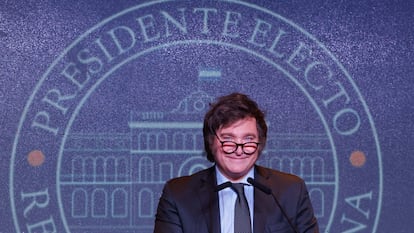Milei to begin his presidency with a wave of privatizations
The far-right president-elect has announced that he will sell the oil company YPF, the energy company Enarsa and public media organizations


The president-elect of Argentina, Javier Milei, on Monday began a transition full of obstacles. He was barely able to announce the names of some of his future ministers and suspended the meeting he had agreed with the outgoing president, Alberto Fernández, as he was unhappy with details such as the location and the guests to be included in the photograph. But he has already advanced some of his first measures. As soon as he takes office on December 10, Milei will initiate a wave of privatizations beginning with the oil company YPF, the energy company Enarsa, and the conglomerate of public media organizations.
The leader of Argentina’s new ultra-right wing has three weeks to put together his cabinet, but he has no colleagues to spare. His party, La Libertad Avanza, lacks sufficient figures to occupy the highest positions in the administration; he is dependent on those who can contribute the strength of former President Mauricio Macri, Milei’s new ally.
The president-elect also fears that while he is preparing to assume of office, the outgoing government may implement measures that may be detrimental to him. He has reasons to do so. His rival in the presidential run-off vote, Sergio Massa, who is also minister of economy, warned Milei on the night of his electoral victory that it was now his responsibility to keep inflation — now at 142% year-on-year — at bay. Massa even hinted that he was ready to resign, now that his job as minister-candidate was finished.
Milei made little progress in management issues, but abounded in political definitions. On Monday morning, he toured the local radio stations repeating what his first governmental measures would entail: privatizations, controlling social protests, and dollarization. “Everything that can be in the hands of the private sector, is going to be in the hands of the private sector,” he said. This is not the first time that Argentina has embarked on a privatization wave: in the 1990s, the liberal Peronist Carlos Menem left no public company unsold, in a long process that culminated with the YPF oil company, when he was just days away from handing over power in 1999. In 2012, the government of Cristina Fernández de Kirchner renationalized the company, which was in the hands of Repsol. Milei pointed precisely to YPF, which he promised to use “as a bridge for the readjustment of the energy system,” and Enarsa. “The transition will take more or less two years,” he said, one more than he envisages for the dollarization of the economy, his flagship policy in the fight against inflation. “That can be done in a year and once the laws are sanctioned,” he said.
The depth of the changes proposed by Milei is already reminiscent of the “surgery without anesthesia” that Menem applied when hyperinflation was devastating the country in 1990. At that time, many of the measures generated social discontent, with protests and strikes. Milei took note of that experience and warned that he is prepared to face those “who oppose change to defend their privileges.” He was not referring to “the political caste,” the same he promised to fight during the campaign, but to the employees and civil servants who could lose their jobs. The president-elect revealed that he had already contacted the mayor-elect of the city of Buenos Aires, Jorge Macri, to “maintain order in the streets,” adding that he will not tolerate riots.
Containing possible protests will be only one of the challenges the new government will face. Milei will have only 38 out of 257 deputies in Congress and will need the 30 deputies that former president Macri may provide him with in order to be competitive. Milei’s bloc will face 108 Peronist legislators in opposition, who will also have control of the Senate. Despite its defeat at the polls, Kirchnerism will hold the key to block or approve laws and ratify presidential decrees. Milei will have no choice but to negotiate with leaders whom he has been calling “filth,” “thieves” and “fucking leftists” for months.
The president-elect will not enjoy political support beyond the capital either: La Libertad Avanza will not have a single provincial governor in a landscape dominated by Peronists, radicals (social democrats) and local forces that usually sell their votes to the highest bidder, according to their needs. This opposition dispersion will complicate the agreements of a leader who has not displayed any signs of a flair for negotiation.
War against inflation
The economy, however, is the biggest fire Milei will have to deal with. He also has little time for trial and error. Monday was a holiday in Argentina and there was no foreign exchange market. On Tuesday, it will become known how local investors have received his electoral victory. The focus will be on the blue dollar, which rises and falls freely according to supply and demand. On Friday, it closed at around 1,000 pesos per unit; keeping it under control will be the main challenge during the transition. If Massa finally decides to step aside, the economy will be left rudderless. Milei did not take well to the warnings of the economy minister, to the extent that he decided to postpone his meeting with President Fernández to move forward with the transition. “Let them take responsibility until the end of the term, on December 10,” said Milei.
On the external front, at least, his triumph went down well. Shares of Argentine companies listed on Wall Street soared between 4% and 36%, with special interest in those linked to the energy and banking sectors. The company that benefited most was precisely YPF, which is now for sale. Argentine debt bonds also rose between three and six points. On the political front, the regional leaders of the ultra-right embraced Milei, whom they consider the spearhead of a resurgence of the conservative wave once led by Donald Trump and Jair Bolsonaro, the former Brazilian president who has accepted Milei’s invitation to his investiture. “That’s perfect, it’s a goal from midfield”, said the Argentine, who considers President Luiz Inácio Lula da Silva a representative of “international communism.”
Milei’s victory over Massa by more than 10 percentage points has not only mobilized the ultra-right. Defeated Peronism is now in intensive care, forced to rearm after the inevitable decline of Fernández de Kirchner, the movement’s leader. The outgoing vice-president has not spoken since the defeat of her candidate. The focus is on the governor of the province of Buenos Aires, Axel Kicillof, the Peronist who holds the most powerful position after the president. Kicillof answers to Kirchner but aspires to spread his wings now that Massa is badly wounded. His stronghold is the largest, richest, and most populated in the country, an ideal territory to start the process of Peronism’s political reconstruction.
Sign up for our weekly newsletter to get more English-language news coverage from EL PAÍS USA Edition
Tu suscripción se está usando en otro dispositivo
¿Quieres añadir otro usuario a tu suscripción?
Si continúas leyendo en este dispositivo, no se podrá leer en el otro.
FlechaTu suscripción se está usando en otro dispositivo y solo puedes acceder a EL PAÍS desde un dispositivo a la vez.
Si quieres compartir tu cuenta, cambia tu suscripción a la modalidad Premium, así podrás añadir otro usuario. Cada uno accederá con su propia cuenta de email, lo que os permitirá personalizar vuestra experiencia en EL PAÍS.
¿Tienes una suscripción de empresa? Accede aquí para contratar más cuentas.
En el caso de no saber quién está usando tu cuenta, te recomendamos cambiar tu contraseña aquí.
Si decides continuar compartiendo tu cuenta, este mensaje se mostrará en tu dispositivo y en el de la otra persona que está usando tu cuenta de forma indefinida, afectando a tu experiencia de lectura. Puedes consultar aquí los términos y condiciones de la suscripción digital.








































